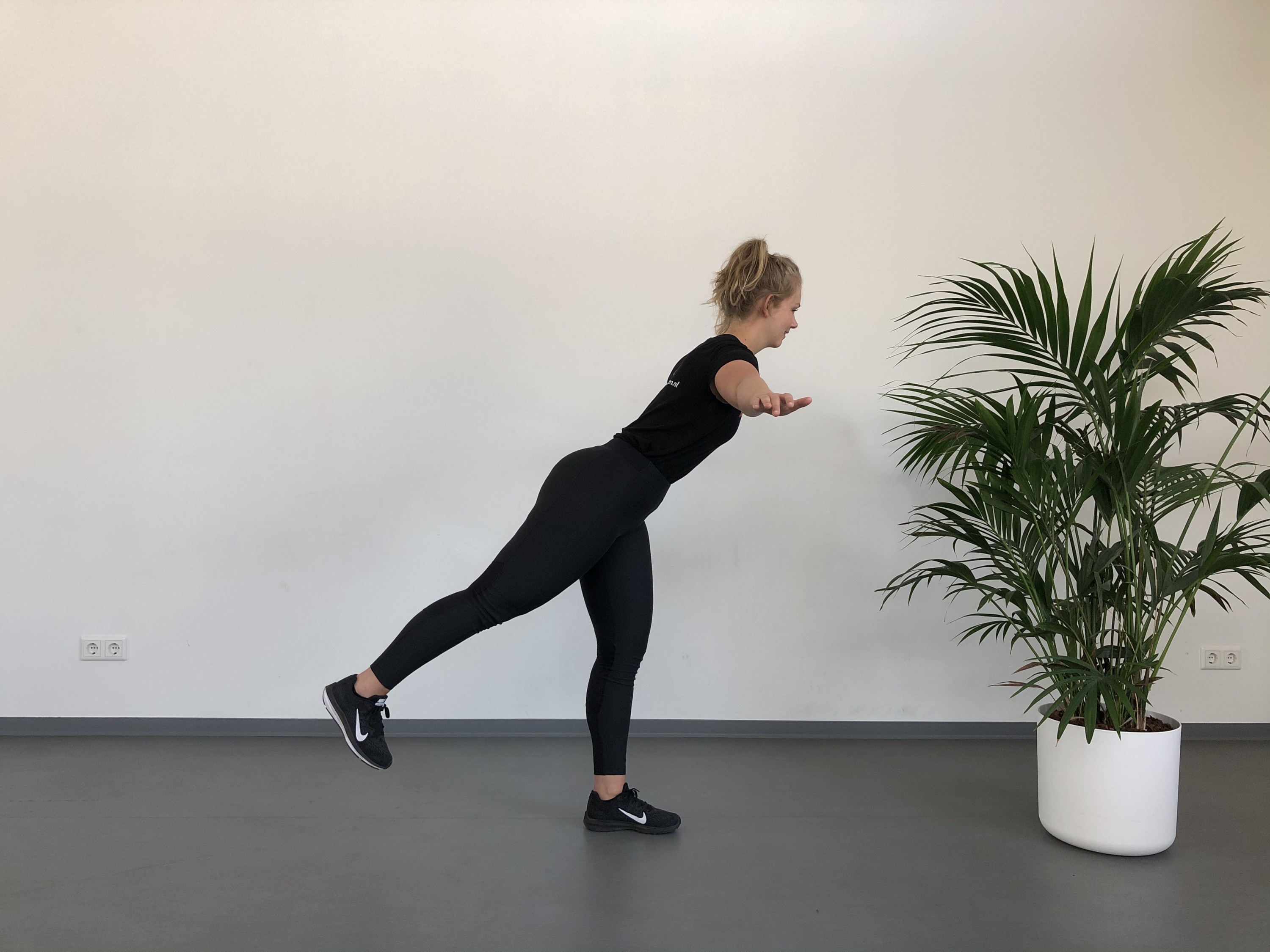
Hamstring tendinopathy
The hamstring muscle/tendon runs at the back of the thigh from the seat tube (tuber ischiadicum) and has its attachment at the knee joint and the fibula. The main function of this muscle is to bend the knee and extend the hip. In total we have three hamstring muscles. There are two hamstring muscles on the inside and one group of muscles on the outside. The outer hamstrings are most commonly affected, especially the outer hamstring muscle (biceps femoris).
Phase 1 of recovery
During this phase, the goal is to reduce the load on the hamstrings. It is recommended to start with additional exercises.
1. Rekken hamstring
Ga op heupbreedte staan, stap met het aangedane been naar voren. Ga op de hak staan, trek de tenen naar u toe. Houdt de knie van dit been gestrekt en kom vervolgens met het bovenlijf naar boven. Dit geeft rek aan de achterzijde van het bovenbeen, behoudt deze positie.
2. Bruggetje
Bruggetje, kom op je rug liggen met je benen gestrekt. Leg je hakken op een grote bal en kom met je heupen omhoog. Hou deze positie vast.
3. Hip bridge op bal
Hip bridge op bal, steun met je schouders op een bal. Plaats de voeten dicht bij de verhoging en kom vervolgens met de billen volledig omhoog, herhaal de beweging.
Phase 2 of recovery
In this phase, the goal is to strengthen hamstrings through exercises. It is important to gradually build up the load.
1. One leg Hamstring Slide
Ga op je rug liggen en leg een handdoek onder je voet. Schuif 1 been naar voren toe. Schuif vervolgens je been weer terug. Herhaal deze beweging en wissel daarna van been.
2. Hamstring curl
Ga op de rug liggen, plaats beide benen op de bal. Kom met de billen van de grond. Trek vervolgens de hakken naar de bil toe en beweeg weer langzaam terug.
3. The Diver
The "diver" exercise is a type of exercise that targets the muscles of the core, specifically the rectus abdominis (also known as the "six-pack muscle"). The exercise is typically done in a controlled, slow and precise manner.
4. One leg Hamstring curl
Ga op je rug liggen met 1 been op de swissball. Breng je billen van de grond. Houd je been gestrekt en trek vervolgens de swissball met je hak naar je billen toe. Herhaal deze beweging en wissel daarna van been.
Pilates ball
Hard. Compact. Qualitatively.

Fitness mat
Hard. Compact. Qualitatively.

The meanig of a hamstring tendinopathy
This is an injury that occurs due to deterioration in the quality of the tendon. The pain is often felt just below the glutes on the edge of your sitting bones (ischial tuberosity). The hamstring has its origin on the sitting bone (ischial tuberosity) after which it splits and extends down to the fibula (biceps femoris longus and brevis muscles) on the outer side of the knee and the tibia (semitendinosus and semimembranosus muscles) on the inner side of the knee. The main function of the hamstrings is to bend the knee and they also extend the hip.
The causes of a hamstring tendinopathy
When the injury is acute, it is often described as a feeling of shooting pain or sharp pull during take off. This more often affects the outer part (biceps femoris muscle). The injury can also have a gradual onset without a traumatic moment. This happens as the quality of the tendons deteriorates over time (degenerative changes). This can be caused by repetitive strain like frequent bending, lunging or gardening. Changes in load and use of the hamstrings can also be a cause of injury.
The symptoms of a hamstring tendinopathy
Stiffness after getting up following prolonged sitting is common and it gets better after ‘warming up’ through movement. After a few minutes of moving you tend to feel the stiffness ease and moving becomes easier. Sometimes the pain is constant and does not reduce with movement. Loss of strength may be present. Putting on shoes, walking up stairs, sitting cross-legged and getting up from a chair are often aggravating factors.
The treatment of a hamstring tendinopathy
A targeted exercise programme aimed at strengthening the hamstring and entire lower limb kinetic chain is needed. If no significant improvement is made within 3 months, shockwave therapy can be considered. A small study has shown 85% efficacy in reducing symptoms. Total recovery time ranges from 12 weeks to a year.
Synonyms
Tendinopathy, tendinitis, hip pain, pulled hamstring, torn hamstring
Advice
If you have any questions regarding the exercises, doubt if you are doing them correctly or aren’t sure they are suited for your condition, please contact your physiotherapist for support.
Attention:
Yourbody.coach offers a range of exercises. Yourbody.coach can not be held responsible if you develop injuries. Always consult your physiotherapist or specialist.